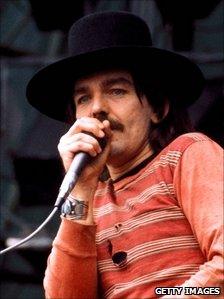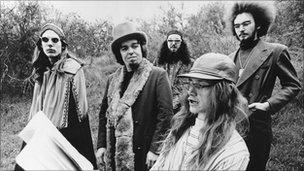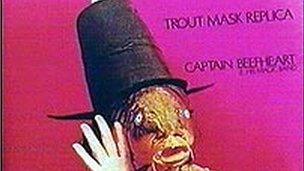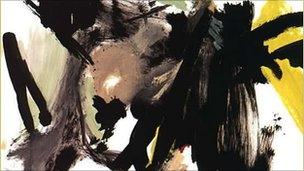Obituary: Captain Beefheart
- Published

Always unpredictable
With a growling bass voice, that whooped and hollered in the manner of one of his earliest heroes, bluesman Howlin' Wolf, Captain Beefheart became a hugely influential figure in rock music.
Artists like Tom Waits, Nick Cave, Franz Ferdinand, Oasis, Red Hot Chilli Peppers and The White Stripes are among those who have cited him as an influence.
Later, under his real name Don Van Vliet, he became an acclaimed painter.
He was born in 1941 in suburban Glendale, California, where his father drove a baker's van. He was an only child, and his grandparents lived next door. His family indulged his artistic talents - he was sculpting from the age of four.
As a teenager, he discovered the blues along with childhood friend Frank Zappa, who was to remain a friend, and rival, throughout his life.
Together, in Lancaster, California, in the Mojave Desert, Zappa and Van Vliet came up with the name Captain Beefheart and the latter formed a blues band, His Magic Band, in the mid-1960s.
Trout Mask Replica
Though the band's title remained with Beefheart over two decades, the band's membership was to change frequently.
After establishing themselves with a small but devoted following, the band, augmented by a 20-year-old slide guitarist named Ry Cooder, made their first album, Safe as Milk, in 1967.
Although blues-inspired, the album reflected the era of psychedelia by its surrealist tendencies. It also hinted at the avante-garde that was to become Captain Beefheart's trademark.

One of the many Magic Band line ups
Various record labels wanted to establish Captain Beefheart as an American alternative to the British blues bands of the 1960s or as a pop band to rival The Beatles.
But Van Vliet would not allow them to curb his artistic expression and there were frequent fallings out.
Many fans regard his masterpiece to be the 1969 album, Trout Mask Replica, a dadaist blend of blues, free-form jazz, rock and beat poetry.
Legal disputes
Sometimes manic, always unpredictable, the album was at first deemed as impenetrable. Yet, to its supporters, it showed itself to be a complex mix of metaphor and use of wordplay. "A verbal prankster" was how British DJ John Peel described Beefheart.
The album was produced by Frank Zappa who gave his friend full artistic rein.
"If it had been produced by any professional, famous producer," Zappa said later, "there could have been a number of suicides involved."
John Peel described Beefheart as being " driven in pursuit of his music to the borderline between imbalance and genius."

Trout Mask Replica is considered his masterpiece
He suffered constantly from anxiety attacks. For Trout Mask Replica, he kept his musicians in a house for the eight months it took to write the double album, only allowing them out once a week to get groceries.
There was very little money with which to buy anything but the most basic of provisions. The conditions were described by one band member as "cult-like".When Zappa eventually got to record the album, it took less than five hours. The lyrics were nonsensical and surreal, and the band members were given nicknames like Mascara Snake, Zoot Horn Rollo and Rockette Morton.
The album dispensed with a regular rock beat, constantly changing its songs' time signatures. "I don't like hypnotics," said Beefheart, "I want things to change like the patterns and shadows that fall from the sun."
Artist
His next album, Lick My Decals Off, Baby was equally experimental in nature, but subsequent offerings such as The Spotlight Kid and Clear Spot were far more commercially viable.
Beefheart's often errant behaviour caused no end of problems with record companies and, in the 1970s, he became embroiled in various legal disputes which precluded his ability to tour. This deprived audiences of one of the finest live acts of the era.
He also proved too hard a taskmaster for many of the band members and there was constant to-ing and fro-ing.
His next two albums Unconditionally Guaranteed and Bluejeans and Moonbeams were derided by fans as being too commercial, but the later Bat Chain Puller and Ice Cream for Crow were acclaimed.

He gave up music in favour of abstract art
Throughout his music career, Captain Beefheart kept up a prolific output of sketches and paintings. He was eventually persuaded that if he was to be taken seriously as an artist and not regarded simply as a musician who paints, he should give up music.
He returned to his home near the Mojave Desert in southern California and became reclusive. He became more and more renowned as an abstract expressionist whose work, like his music, is regarded as original innovative. It fetches high prices.
Eventually, Captain Beefheart/Don Van Vliet was unable to paint after contracting multiple sclerosis.
His work, whether in music or drawing, was never mainstream and only ever gained a relatively small following, but he was a larger-than-life character who pushed the boundaries of his art in a way which influenced many who followed in his wake.